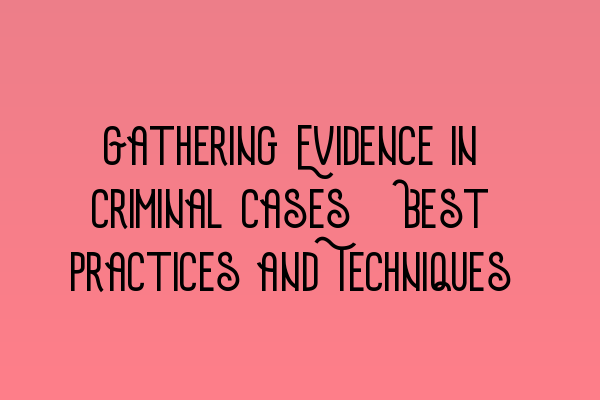Gathering Evidence in Criminal Cases: Best Practices and Techniques
Welcome to the SQE Criminal Law & Practice Law UK blog. In today’s post, we will discuss the best practices and techniques for gathering evidence in criminal cases. As criminal solicitors, it is crucial to have a solid understanding of the various methods and strategies to ensure a successful case outcome.
The Importance of Gathering Evidence
Effective evidence gathering forms the foundation of any criminal case. It provides the necessary support to prove or disprove allegations, establish the credibility of witnesses, and enable accurate assessment of guilt or innocence.
Before diving into the different techniques, it is important to familiarize yourself with the SQE exams. To test your knowledge, you can access the SQE 1 Practice Exam Questions to assess your understanding of criminal law principles. Furthermore, you can take advantage of our SQE 1 Practice Mocks FLK1 FLK2 to enhance your preparation for the exam.
Understanding Different Techniques
1. Document Examination
Thoroughly analyzing documents, such as invoices, receipts, contracts, and correspondence, can often reveal valuable clues and inconsistencies. It is crucial to pay attention to details, handwriting analysis, and any possible alterations.
2. Witness Statements
Interviewing eyewitnesses and obtaining detailed witness statements is crucial for building a strong case. Witness statements should be comprehensive, accurate, and obtained under proper protocols. To ensure you are well-prepared, you can enroll in our SQE 2 Preparation Courses tailored to enhance your interviewing skills.
3. Forensic Evidence
Forensic evidence, including DNA analysis, fingerprints, ballistics, and toxicology reports, can provide strong evidentiary support in criminal cases. It is important to collaborate with experts in forensic fields and understand the methodologies used to analyze such evidence to effectively present it in court.
4. Surveillance
Surveillance techniques, such as video recordings, undercover operations, and tracking devices, can be valuable in gathering evidence in certain cases. However, it is essential to ensure compliance with legal requirements and privacy laws.
Preparing for the SQE Exams
As you enhance your understanding of gathering evidence techniques, it is crucial to also focus on your overall exam preparation. To ensure a comprehensive approach to your SQE exams, we offer SQE 1 Preparation Courses that cover all relevant subjects and provide practice materials to strengthen your legal knowledge.
For information on upcoming SRA SQE exam dates, you can refer to our detailed article: SRA SQE Exam Dates.
We hope this article has provided valuable insights into the best practices and techniques for gathering evidence in criminal cases. Effective evidence collection plays a vital role in achieving positive outcomes for your clients. Stay tuned for more informative articles from SQE Criminal Law & Practice Law UK.
